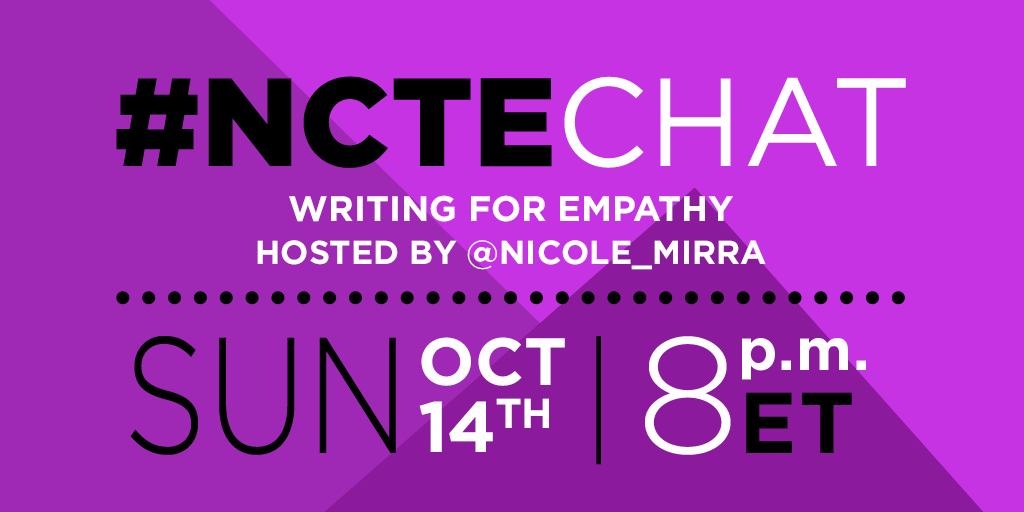This post is written by Nicole Mirra (@nicole_mirra), host of October’s #NCTEchat on writing for empathy. We hope you will join us on Sunday, October 14, at 8:00 p.m. ET for a Twitter chat just in time for the National Day on Writing!
“You think your pain and your heartbreak are unprecedented in the history of the world, but then you read. It was books that taught me that the things that tormented me most were the very things that connected me with all the people who were alive, or who had ever been alive.” —James Baldwin
Pain and heartbreak are indeed palpable in the United States today. Divisions of race, class, religion, and legal status roil our public life as we argue over whose lives matter, who belongs in our country, and what it means to be American. We are polarized in terms of where we get our news, what challenges we face, and how we propose solving them—and we are finding it increasingly difficult to talk across our differences.
Before he became president, then-Senator Barack Obama told a group of college graduates that this inability to connect across personal and political divides represents an “empathy deficit.” He declared that educated citizens must reject an ethic of individualism in favor of collective identification to successfully navigate the challenges our country will face throughout the twenty-first century.
This charge raises critical questions for English teachers as students come to us with their questions, fears, and hopes about their society. For instance, what role (if any) should schools play in fostering empathy in students? What, for that matter, is empathy? And what kinds of educational practices can reverse the empathy deficit and produce compassionate, democratically engaged young adults?
I believe that public schools have an essential obligation to educate toward the knowledge, skills, and dispositions that the next generation of citizens will need to sustain democratic life—and I believe that empathy is one of those key dispositions.
And, building on James Baldwin’s assertion that literacy (and literature) possesses unique power to connect “all the people,” I believe that English teachers have a unique and uniquely powerful role to play in engaging with empathy.
I argue that English teachers occupy a uniquely powerful position when it comes to educating for empathy, because they are charged with shaping literate individuals—an awesome responsibility that encompasses not merely teaching the skills of reading, writing, listening, and speaking, but also mentoring students to use these skills to carve out personal, professional, and civic identities, grapple with the enduring joys and sorrows of what it means to be human, and contribute to the continuing conversation about how we should best live together in this interconnected society. Literacy is not only about reading the word, but also about reading the world (see Literacy: Reading the Word and the World, by Paulo Freire and Donaldo P. Macedo). As such, English teachers can’t help but get involved in helping students navigate relationships with others and think about empathy.
I suggest that we should consider the development of empathy in students a primary goal of English education because it offers an organizing principle for our field that is grounded in hope, love, and a commitment to a more equitable society.
Embracing a purpose to shape young adults who can step outside their personal experience to compassionately imagine the lives of others can actually help us organize and streamline our practice so that we don’t feel pulled in a million different directions, but instead feel committed to one. We can create lessons, implement routines, and develop relationships with students in ways that are empowering instead of overwhelming.
In Sunday’s chat, I encourage our NCTE community to examine how reading and writing practices can foster empathy in students. Let’s talk about how pre- and inservice teachers can be prepared to design learning experiences with empathy in mind. In doing so, I encourage us to embrace responsibility for inspiring civic engagement, advocating for social justice, and imagining a more perfect union.
The following questions will be shared during our Twitter chat, after introductions:
Q1. How do you understand the concept of empathy? What does it mean to empathize with someone? #NCTEchat #WhyIWrite
Q2. What role do you think the field of English language arts can or should play in fostering empathy among students? #NCTEchat #WhyIWrite
Q3. What are some examples of writing prompts or assignments you’ve given that strive to spark empathy in students? #NCTEchat #WhyIWrite
Q4. What does it look like, sound like, and feel like when you see students beginning to empathize with others in their writing? #NCTEchat #WhyIWrite
Q5. What are the challenges that come with trying to teach and write for empathy, particularly in today’s polarized context? How do you manage these challenges? #NCTEchat #WhyIWrite
Q6. What role does writing play in helping our students (and all of us) to imagine a more compassionate and empathetic future? #NCTEchat #WhyIWrite
We hope to see you there! Be sure to join us by using #NCTEchat.
Never participated in a Twitter chat before? Check out this guide to help you get started.
 Nicole Mirra is an assistant professor of urban teacher education in the Graduate School of Education at Rutgers University. She previously taught high school English in New York City and Los Angeles and has been an NCTE member since 2008. Her research explores the intersections of critical literacy and civic engagement with youth and teachers across classroom, community, and digital learning environments. Her new book, Educating for Empathy: Literacy Learning and Civic Engagement, was just published last month by Teachers College Press.
Nicole Mirra is an assistant professor of urban teacher education in the Graduate School of Education at Rutgers University. She previously taught high school English in New York City and Los Angeles and has been an NCTE member since 2008. Her research explores the intersections of critical literacy and civic engagement with youth and teachers across classroom, community, and digital learning environments. Her new book, Educating for Empathy: Literacy Learning and Civic Engagement, was just published last month by Teachers College Press.

